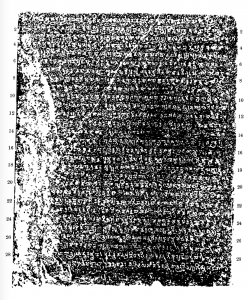
This stone inscription, inscribed on the side wall of the outside veranda of cave 17, is much damaged by exposure, which according to Shastri (1997: 46), has lead the correct decipherment of the inscription to be very problematic. The inscription starts with a dedication to the Buddha, unusual as many of the Vākāṭaka period inscriptions and charters are dedicated to Hindu gods. The inscription was carved to record the creation of Buddhist stupas and institutions by a ruler called Dharādhipa and with the wish for the longevity of these structures. The inscription was carved under the name of Ravisāmba, a vassal of the Vākāṭaka king Hariṣeṇa. The inscription also includes a genealogy for Dharādhipa and Ravisāmba.
(Verse 1) Having bowed to the sage (Buddha) who has completely mastered the three lores and who is a thunderbolt to the tree of worldly existence, …….. I will set forth a description of the excellences of the donor of the Vihâra, whose deeds are pure
(V. 2) To the lord of man (named…), who wore a parasol (over his head) and who made his name significant by the protection of the people, was born a son, Dhritarâshtra by name, who had a white parasol
(V. 3) [The son] of that king ……… was Harisâmba, whose face was lovely as a lotus and the moon. Again, the son of that king was king Śaurisâmba, endowed with spotless beauty
(V. 4) The resplendent Upêndragupta of wide-spread fame. …………. [was begotten] by him. Then he had a younger son who became well-known as king Kâcha (I).
(V. 5) [From him was descended] ……. Bhikshudâsa in order to deposit his splendour and glory [on the earth] A son of that lord of men was a king named Nîladâsa, renowned on the earth.
(V. 6) His son of brilliant fame ……… became well known as Kâcha (II). Then to that king was born Krishnadâsa, who augmented the splendour of (his) race and line
(V 7) His wife was Atichandrâ, the daughter (of) ……… clad in garments as white as the rays of the moon, whose face resembled the full moon and whose ornaments were modesty and virtuous conduct
(Vv 8-9) [He] obtained (her) who brightened the land in the form of suppliants
From her he had two sons resembling Pradyumna and Sâmba, who had longish, lotus-like eyes and lovely bodies like burnished gold ………….. The elder (of them) bore the title of a king, while the second bore the appellation Ravisâmba.
(V 10) Having subjugated prosperous countries such as Aśmaka ………. [the two princes] whose prowess had become fruitful, shone like the sun and the moon.
(V 11) While they, whose honour was dependent on ………….. and whose creeper like affection and glory had grown very much, were living always in concord and happiness,―
(V 12) [Fate] ……….. whose decree is not to be evaded even by superhuman beings and whose dread power was produced by the deeds done in a previous life, announced the thunderbolt of impermanence in the case of the younger (brother)
(V 13) [Having oversome] as if with firmness, the diseases of the body and the mind, [the elder brother] ……., having always the consciousness of transience, made thereafter the great tree of religious merit grow.
(V 14) He served those who ……., who possessed great learning, liberality, compassion, contentment, friendship, forgiveness, courage and wisdom, and who left pleased with
(V 15) He, who was of pure conduct, habitually imitated in his deeds honourable kings of noble conduct
(V 16) He made ……… The suppliants being satisfied (with gifts) spread, in the same way, the fame of other suppliants.
(V 17) He released by the power of the expediture of wealth ……. whose eyes were suffused through fear, as though they were his (own) dear sons
(V 18) Even he who had been treated affectionately like a son repeated, like a knowing human being, the excellent and pure thoughts in his heart
(V 19) “(Rich persons) ………. failed to attain, because of their wealth, the siddhi rightly so colled (obtainable) by devout meditation on the Omniscient (Buddha)”
(V 20) He adorned the whole world by the light of his fame, bright like the rays of the moon ……. by collecting materials
(V 21) While that moon among the princes, Harishêna, whose face resembles a lotus and the moon, and who does what is beneficial for (his) subjects ……. is protecting the earth
(V 22) He, who has a very marvellous store of merit ……. adorned the earth with Stûpas and Vihâras, ans caused the joy of suppliants by conferring gifts (on them)
(V 23) On a spur of the Sahya (mountain), looking beautiful with clouds, which, with the confused noise of …….. always pass over it (as if) to provide it with a canopy
(V 24) [He excavated] this monolithic excellent Hall, containing within it a Chaitya of the king of ascetics (I e, of the Buddha) and possessing the qualities of stateliness
(V 25) Having expended abundant [wealth], he caused to be made this donated [Hall] which is almost measureless and which cannot be even imagined by little-souled men
(V 26) He caused to be dug (near it) a large cistern pleasing to the eyes and filled with sweet, light, clear, cold and copious water
(V 27) ………. delightful to the eyes and the mind …. In another part of it in the west he caused to be made a grand Gandhakutî
(V 28) May all the blessings desired for the attainment of sidhhi caused by devout meditation on the lord of sages (i e Buddha) attend him, who in all his deeds strives for the welfare of the people
(V 29) May this Hall out of affection ………. cause the attainment of well-being by good people as long as the sun dispels darkness by its rays